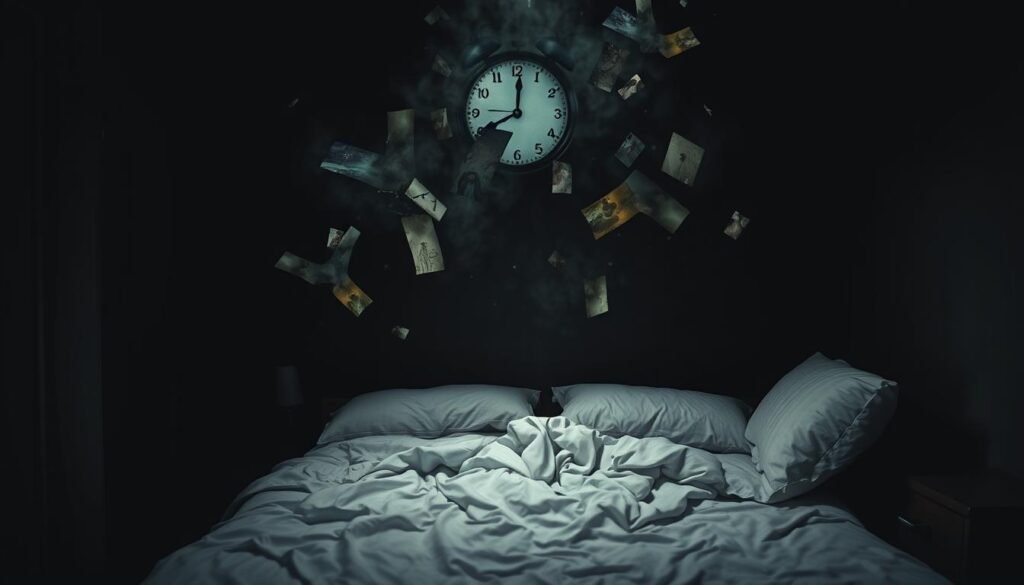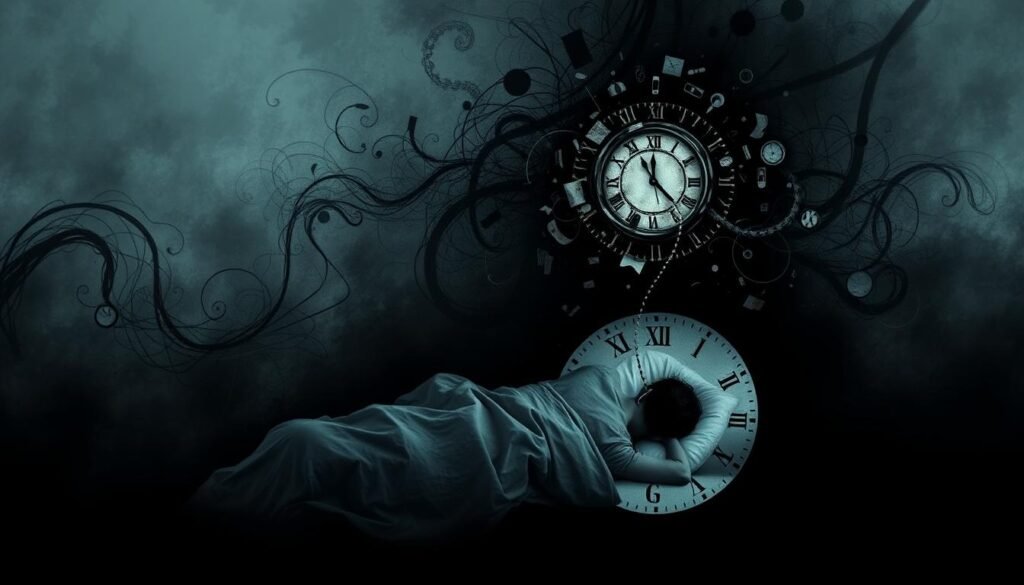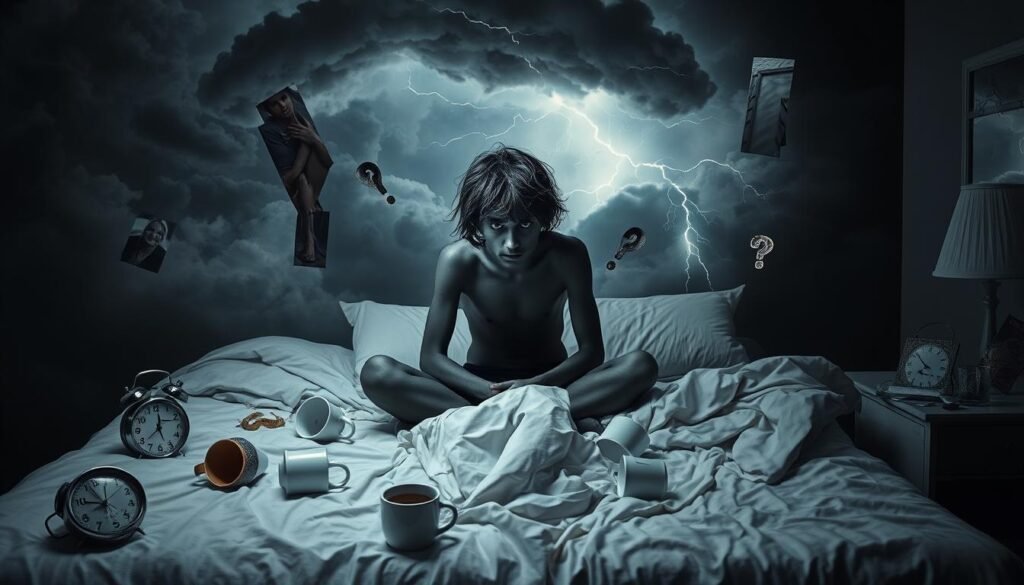About 40% of those with panic disorders say they have panic attacks after poor sleep. This alarming fact shows the strong link between sleep deprivation and higher anxiety. Lack of sleep does more than make you tired; it can make you feel more anxious and can make panic disorder worse. As mental health issues become more common in the United States, it’s vital to understand this connection.
Many people don’t know how their sleep affects their mental health. False beliefs about how much sleep we need and the sleep habits of young adults can cause more anxiety and panic attacks. In our busy lives, where about one in three adults don’t sleep the recommended seven hours, seeing the signs of sleep-related anxiety is key. Improving how we sleep and understanding its link to anxiety can help us control our emotions better. For more details on this topic, check out this resource.
Key Takeaways
- The average adult needs about seven hours of sleep, while teenagers require nine hours.
- 40% of individuals with panic disorders experience attacks after a sleepless night.
- Chronic lack of sleep can create a vicious cycle that worsens anxiety.
- Sleep deprivation affects cognitive functions like memory and decision-making.
- Improving sleep hygiene can significantly reduce anxiety levels.
- Therapeutic approaches like cognitive-behavioral therapy can address sleep-related anxiety.
- Understanding the interplay between sleep and anxiety is crucial for mental health management.
Understanding Anxiety and Its Impact on Sleep
Anxiety includes feelings like worry, unease, and fear. It’s common in daily life. But, when it’s too much, it can mess with your happiness and sleep.
Definition of Anxiety
The anxiety definition describes it as fear about what’s coming. Symptoms may be a fast heartbeat, restlessness, and being easily upset. This can make day-to-day life tough. For those dealing with anxiety, it can turn into a long-term issue. It’s key to understand its different forms.
Common Anxiety Disorders in the U.S.
In the U.S., anxiety disorders are very common. Mental health statistics show about 20% of U.S. adults have an anxiety disorder. Here are some usual ones:
- Generalized Anxiety Disorder (GAD): Affects 3.1% of the U.S. adult population.
- Panic Disorder: Affects 2.7% of U.S. adults.
- Social Anxiety Disorder: Affects 7.1% of the adult population.
- Specific Phobias: Affects 9.1% of U.S. adults.
- Obsessive-Compulsive Disorder (OCD): Affects 1.2% of the adult population.
- Post-traumatic Stress Disorder (PTSD): Affects 3.6% of U.S. adults.
Anxiety can really affect people’s lives. Around 43% feel it mildly, 33% moderately, and 23% severely. So, knowing and managing anxiety well is very important.
| Anxiety Disorder | Prevalence (%) |
|---|---|
| Generalized Anxiety Disorder (GAD) | 3.1% |
| Panic Disorder | 2.7% |
| Social Anxiety Disorder | 7.1% |
| Specific Phobias | 9.1% |
| Obsessive-Compulsive Disorder (OCD) | 1.2% |
| Post-traumatic Stress Disorder (PTSD) | 3.6% |
| Overall Anxiety Disorders | 20% |
The Relationship Between Sleep and Anxiety
Seeing how sleep and anxiety affect each other is eye-opening. Not getting enough sleep plays a big part in how we feel emotionally. This lack of sleep starts a cycle of worsening anxiety. Having good sleep is key for our mental health. When our sleep is off, our emotional well-being takes a hit too.
How Sleep Deprivation Affects Emotional Health
Not sleeping enough really hits our emotional health hard. It wears down our mind’s ability to think and handle stress. This makes us more open to anxiety and depression. Research shows that when our sleep is messed up, it throws off brain chemicals. These changes make anxiety worse. Also, worrying about not sleeping well can lead to more sleepless nights. This makes our emotional health even poorer.
Bidirectional Feedback Loop Between Insomnia and Anxiety
The link between not sleeping and anxiety is like a two-way street of trouble. Not being able to sleep makes anxiety spike. Then, feeling super anxious makes getting a good night’s sleep hard. This messes up the parts of the brain that help us manage our emotions, adding to our distress. People with anxiety often can’t sleep well. They feel tired all day. This tiredness makes their anxiety worse. It’s important for treatments to focus on both sleep and anxiety together.
Can Lack of Sleep Cause Anxiety Panic Attacks
Looking into how sleep and panic disorders are connected shows us a lot. Studies link not getting enough sleep to more panic attacks in people who tend to be anxious. A key study found that 40% of those with panic disorder had more panic attacks if they didn’t sleep well the day before. This makes it clear we need to be aware of how sleep deprivation panic attacks affect us and think about how to help.
Research Findings on Sleep Deprivation and Panic Disorders
Research on panic disorder shows a tricky relationship between how well you sleep and how anxious you feel. Even after not sleeping well, people with panic disorders showed normal brain activity in studies. But, unlike those without the disorder, they didn’t feel better after missing sleep. On the other hand, some who felt depressed said they felt less anxious and sad after not sleeping well.
Statistics on Panic Attacks Following Sleep Loss
In the U.S., anxiety disorders touch 20% of adults. Specifically, 2.7% suffer from panic disorder. Surprisingly, 43% of adults say anxiety slightly affects their daily life. Over a third feel it more severely. The fact that panic attacks can happen at night, suddenly waking someone, shows how closely insomnia and panic attacks are linked. Knowing how sleep loss, anxiety, and panic attacks connect is vital for finding ways to help.
| Statistic | Percentage |
|---|---|
| Adults affected by anxiety disorders | 20% |
| Adults with panic disorder | 2.7% |
| Mild impairment from anxiety | 43% |
| Moderate impairment from anxiety | 33% |
| Severe impairment from anxiety | 23% |

Effects of Chronic Sleep Loss on Mental Health
Chronic sleep loss greatly affects mental health, linking closely to anxiety disorders. It can lower the quality of life, making emotional distress worse. This section looks at how insomnia and anxiety are connected. It also covers sleep debt and how it worsens sleep deprivation’s effects.
Insomnia and its Association with Anxiety Disorders
People with insomnia often feel more anxious. Up to 70 million Americans struggle with sleep disorders, affecting their daily lives and mental well-being. The insomnia anxiety impact is especially clear over time. Anxiety can disrupt sleep, which then feeds back to increase anxiety. Lack of good sleep also leads to mental health problems like depression and more stress.
This cycle where each issue makes the other worse is notable. Plus, not sleeping well can affect many parts of mental health. It can make emotional control harder and increase the likelihood of panic attacks.
Understanding Sleep Debt and its Consequences
Looking into sleep debt consequences highlights more worries. Not sleeping enough over time can make you mentally tired and slow down your thinking. It makes dealing with emotions harder and weakens your ability to solve problems. For some, this results in more anxiety or panic attacks.
This shows that not getting enough sleep can really harm your overall mood and mental health. It can be a key factor in serious mental health problems later on.

Symptoms of Lack of Sleep and Anxiety
It’s key to know the symptoms caused by not sleeping enough and anxiety. Lack of sleep brings many physical and mental signs that can make anxiety worse. Knowing these signs helps people take action early on.
Common Physical and Emotional Symptoms
Not getting enough sleep can affect you in many ways. Physically, you could feel:
- Fatigue
- Rapid heartbeat
- Increased respiratory rates
- Gastrointestinal distress
Emotional signs of anxiety might be:
- Irritability
- Feelings of fear and panic
- Difficulty concentrating
- Increased sweating and dizziness
When sleeplessness and anxiety symptoms merge, they make distress worse. People with anxiety conditions, like panic disorder, often face these issues. This cycle impacts their everyday life heavily.
Long-term Effects of Poor Sleep Quality on Anxiety Levels
Long-time sleep problems can deeply affect anxiety levels. Studies show people with anxiety often have trouble sleeping. This bad sleep worsens anxiety, making it tough to manage. Many with panic disorder say poor sleep plays a big role in their struggles.
Also, not sleeping well can raise the risk of more mental health issues. Bad sleep leads to more anxiety over time. Thus, improving sleep could help ease anxiety’s mental burdens.

| Symptoms of Sleep Deprivation | Emotional Symptoms of Anxiety |
|---|---|
| Fatigue | Irritability |
| Rapid heartbeat | Feelings of fear |
| Gastrointestinal distress | Difficulty concentrating |
| Increased respiratory rates | Sweating and dizziness |
By recognizing these symptoms, people can seek effective help. This aids in improving both sleep and emotional wellness.
Strategies for Improving Sleep Quality
Many folks find it hard to get better sleep because they feel anxious and don’t have good sleep habits. Making some changes can really help you sleep better and feel less worried. Even small tweaks in your routine can greatly boost your health and mood.
Sleep Hygiene Tips
To sleep well, it helps to have a good bedtime environment. Here are some ideas to try:
- Try to go to bed and wake up at the same times every day.
- Make sure your bedroom is comfy, with the right temperature and a cozy bed.
- Stay away from caffeine and screens before bed, as they can keep you awake.
- A calming activity before bed, like reading or gentle music, can help you unwind.
Relaxation Techniques to Reduce Anxiety
Relaxation can do wonders for your sleep if anxiety keeps you up. Here are some techniques that ease stress and make sleep easier:
- Deep, slow breathing exercises can really calm your mind.
- Meditation and mindfulness can help clear your head, making it easier to sleep.
- Yoga can improve how well you sleep, especially if you also track your sleep habits.
- Drinking chamomile tea might help you get better sleep and feel less anxious.
If anxiety or sleeplessness is a big problem, looking into professional help could help. Cognitive Behavioral Therapy for Insomnia, or CBT-I, is known to help with sleep issues and anxiety. Using these methods can really make your sleep quality and mental health better.
Seeking Professional Help for Sleep Issues
Getting help for sleep problems often means talking to a professional. Knowing when you need to see a doctor is key if you’re always finding it hard to sleep well. Some sleep issues are short-term, but ongoing troubles might show a deeper health issue. Watch out for signs like having trouble getting to sleep or staying asleep, feeling very tired during the day, or if worry is making everyday life hard. It’s important to seek help when these issues persist.
When to Consult a Doctor
It might be time to get professional help if sleeping well is a struggle. Certain signs mean you should see a doctor:
- Problems sleeping for a long time.
- Feeling worn out during the day, even after sleeping enough.
- Waking up often at night, which affects your health.
- Feeling a lot of worry or panic at night.
- Bad reactions to over-the-counter sleep aids.
Recognizing these symptoms early can lead to getting the right help quickly. This is especially true for sleep problems that make you feel anxious.
Understanding Cognitive Behavioral Therapy for Anxiety and Insomnia
Cognitive Behavioral Therapy (CBT) is very effective for dealing with anxiety and trouble sleeping. This therapy addresses negative thoughts that make sleep hard. It helps improve sleep habits and tackles worrying thoughts that keep you awake.
The treatment usually includes:
- Spotting unhelpful beliefs about sleep.
- Finding ways to handle worry better.
- Setting a regular sleep schedule.
- Practicing ways to relax.
CBT offers specific steps to help people sleep better and reduce anxiety. This can improve your overall quality of life.
Personal Stories: Managing Anxiety and Sleep Problems
Many people share stories of fighting anxiety and sleep problems. They tell us how they’ve dealt with these issues and found relief. These stories highlight the importance of support and resilience in getting better sleep.
Examples of Successful Sleep Management
People have found many ways to deal with sleep problems caused by anxiety. They’ve made bedtime routines and used relaxation techniques. They also avoid caffeine and sugar at night and make their sleeping areas comfy.
- Establishing a consistent bedtime routine to signal the body that it is time to rest.
- Integrating relaxation exercises, such as progressive muscle relaxation and deep breathing, to calm the mind.
- Avoiding stimulants like caffeine and sugar in the evening to prevent sleep disruptions.
- Creating a comfortable sleeping environment by investing in quality mattresses and pillows.
Studies in 2021 show that better sleep can lower anxiety, depression, and stress. People’s success stories tell us it’s key to find what works best for you.
Client Experiences with Anxiety Treatment
Clients have shared various journeys in treating anxiety. They’ve talked about the tough times, like battling insomnia from too much worry. Many have found help through Cognitive Behavioral Therapy for Insomnia (CBT-I).
The table below shows different methods and their effects on anxiety and sleep:
| Approach | Description | Impact on Anxiety/Sleep |
|---|---|---|
| CBT-I | Cognitive Behavioral Therapy tailored for insomnia | Highly effective in improving sleep quality and reducing anxiety |
| Relaxation Techniques | Includes deep breathing and progressive muscle relaxation | Helps calm the mind, promoting better sleep onset |
| Sleep Hygiene Tips | Consistent sleep schedule and comfortable sleeping environments | Enhances overall sleep quality |
| Avoiding Stimulants | Limiting caffeine, sugar, and alcohol prior to bedtime | Reduces sleep disruptions and enhances relaxation |
Almost two-thirds of Americans lose sleep because of stress. Every success story reminds us change is possible with the right knowledge and support.
Conclusion
Sleep and anxiety are closely linked, affecting our mental well-being. Studies show that not getting enough sleep can harm our emotions. It can even lead to or worsen panic attacks. About 70 million people in the U.S. suffer from sleep issues. This results in high healthcare costs and less productivity.
Good sleep is very important for our health. Not sleeping well can make us feel more stressed. It might make us see things as threats, causing panic attacks. People with panic disorders often have trouble sleeping. This creates a bad cycle of anxiety and sleeplessness. To improve, it’s key to look after ourselves and get help when needed.
We should try to better our sleep and maybe get professional help, like cognitive behavioral therapy. Taking steps to deal with panic attacks can make our mental health better. To learn more about sleep’s effects on anxiety, check out this detailed article.